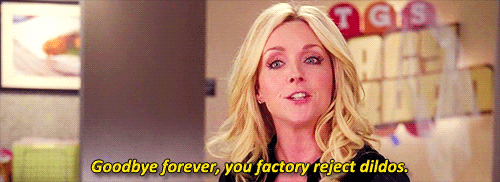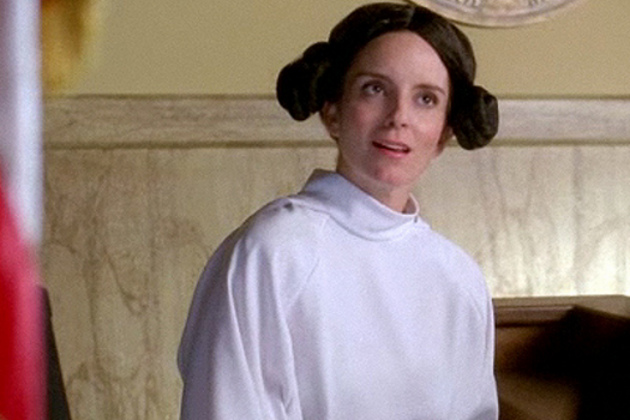Written by Max Thornton.
If you care at all about popular culture and feminism, you may have noticed that last Thursday seven years of television history came to an end.
30 Rock had a complicated relationship with feminism. Linda Holmes of NPR’s Monkey See wrote an excellent article on the difference between what 30 Rock wasand what it did:
I have never considered Liz Lemon a feminist icon of any kind, nor have I ever considered 30 Rock especially strong when it comes to gender politics.I don’t care for the obsessive joke-making about how Liz is ugly/mannish/old/awkward, and I haven’t always been comfortable with the way some of the “she’s baby-crazy!” or “she’s relationship-crazy!” comedy has played. …And yet, I think it’s been one of the most important, helpful, meaningful, landscape-altering shows for women in the history of television.
No assessment of 30 Rock can escape the unfortunate but inevitable tendency to scrutinize every aspect of a female-led show to an unreasonable degree – most of all its creator. Exhibit A is, of course, poor Lena Dunham. The misogynists are looking for any excuse to hate a successful woman, while we feminists are dreaming of intersectional perfection that the mainstream media is never going to provide. As a result, conversations about 30 Rock are inseparable from conversations about Tina Fey. Which at least is an excuse to link to this.
Luckily, 30 Rock was (it feels so weird to be using the past tense) a show with a strong sense of the meta, and as such it pretty much demands contextualization.
A few years ago, Overthinking It pointed out that 30 Rock looked like a staunchly liberal show – “from far away, if you squint.” Once you start paying attention, though, neocon Jack Donaghy tends to be in the right, and the joke is almost always at the expense of Liz Lemon, the leftist comedy writer and (to at least some extent) Tina Fey self-insert characer.
There’s a kind of self-parody you do around friends which you might avoid more publicly, because you know your friends know you’re kidding. My friends and I tend to Godwineach other with wild abandon, because we spend so much time on the internet that we enjoy its utter absurdity. In a discussion with a stranger, though, I probably wouldn’t throw around the wanton Hitler analogies, since there’s a risk they wouldn’t get the joke.
One of the things that was simultaneously endearing and frustrating about30 Rock was its frequent usage of that friends-only self-parody material. When it worked, it made you feel like a good friend of the show and of Tina Fey, sharing in a self-critical but ultimately loving humor. When it didn’t work, it was awful. (Remember the season-five sleep-rape controversy?) A lot of the time, though, it was hard to tell which side of the line the show was on.
This A.V. Club review of a December 2012 episode asserts that “30 Rock is one of the few shows that can cleverly get way with joking about stereotypical female behaviors, such as everyone rushing to the bathroom at the same time or being unable to work the projector, without getting offensive.” I’m not entirely sure I agree with that. Andrew Ti of Yo, Is This Racist? illustrates the problem with the example he sometimes uses, of the season six episode that features Jon Hamm in blackface. In the context of the episode, the brief skit is parodying TV’s history of blackface. That might potentially be a reasonably clever joke, but, as Ti has pointed out on his site and in his podcast, we live in a media culture where things get taken out of context all the time and people have short attention spans, and what that means is that there’s just a gif floating around the internet of Jon Hamm in blackface. I’m inclined to think it’s just hopelessly irresponsible to make jokes like that when you know how widely your material is circulating.
Having said that, 30 Rock had a tough job to do: trying to appeal to as broad an audience as possible, while still maintaining its distinctive voice and viewpoint. And did it ever have a distinctive voice. If, before I saw the episode, I had come across the finale’s line “Hogcock. Which is a combination of hogwash and poppycock,” I couldn’t have mistaken it for a joke from any other show. It’s a style of humor and a general set-up that simply won’t appeal to everyone, and it never translated to particularly high ratings. To avoid alienating uncommitted viewers further, I think the show sometimes had to pull back from fully supporting specific ideals – I seem to recall a number of feminist blogs complaining that the end of the infamous Jezebel-parodying season five episode “TGS Hates Women” was a cop-out, forcing in some unlikely circumstances to avoid actually engaging with the issues it had raised.
Ultimately, I agree with Linda Holmes, that 30 Rock was willing to sacrifice pretty much anything for the sake of a joke. In the end, its effects on the TV landscape are more feminist than its content ever was; but it was a damn funny show, written by and starring a damn funny woman, and I miss it already.
Max Thornton blogs at Gay Christian Geek, and is slowly learning to twitter at @RainicornMax.




I just watched the finale last night and cried like seventeen times.
Hear, hear! Although I have two seasons to catch up on (what have I been doing on Thursday nights?), I miss the show already, too.